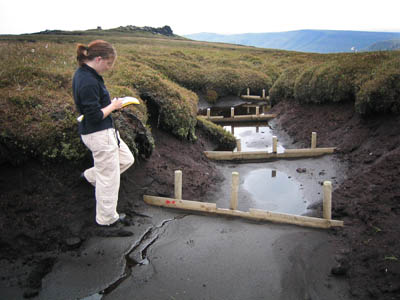 Hundreds of school students will be taking to the hills next month to study the effects of climate change.
Hundreds of school students will be taking to the hills next month to study the effects of climate change.
Schoolchildren from 15 schools will be conducting experiments and collecting data from the uplands of the Peak District in a ground-breaking project to determine how peat moorland is affected by and affects the change in our climate.
Checking wooden gully blocks that help retain moisture on Kinder Scout
The students, aged 14 to 16, will measure water-table depth and water quality; the depth of the moorland peat and vegetation cover and wildlife and biomass. The youngsters will be drawn from education establishments from Yorkshire, Derbyshire, Greater Manchester and Staffordshire.
The activities will take place during National Science and Engineering Week, which runs from 7 to 16 March – yes we know that’s more than a week, we didn’t name it – and aims to improve understanding of the ecology of the Peak District moors.
Students will be able to use a chatroom to share data collected from hand-held devices and using satellite technology. Manchester and Sheffield Universities are involved in the project, which has benefited from a £2,770 from the Economic and Social Research Council.
Project co-ordinator Chris Robinson, of the Peak District National Park Authority, said: “Moors are not only globally rare habitats; they are very sensitive to climate change.
“They store more carbon than all the forests in the UK and France put together, but have suffered centuries of erosion, fire damage and pollution. A healthy moorland will help mitigate climate change, whereas an unhealthy one will only add to the problem.
“The students’ research will make an important contribution to the restoration and conservation work of the £4.7m Moors for the Future project in the Peak District National Park.”
National park rangers and education officers will also help in the project. A second week of experiments will take place in autumn.